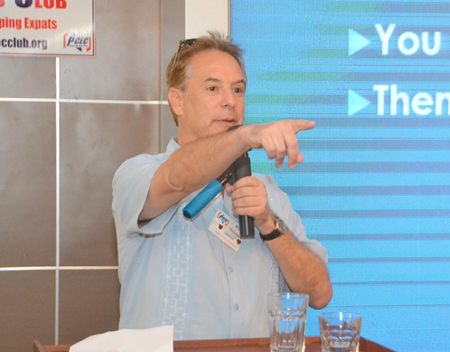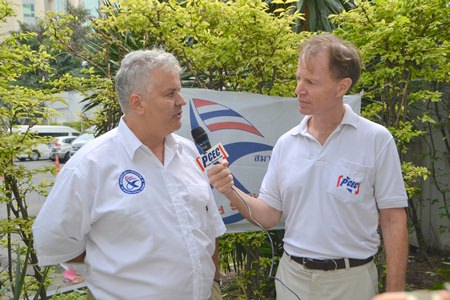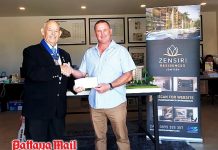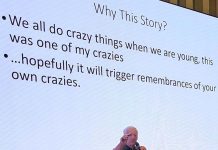Helping the disabled and mentally challenged to sail; this is the primary goal of the Disabled Sailing Thailand Association. At the February 7 meeting, Peter Jacops and Francisco (Xisco) McGrath gave a presentation on their involvement with the association and its goals.
First up was Peter who was born in Belgium and has had a passion for boats and the sea since a very young age. He gave his background in the merchant marines and his current duties as a marine surveyor for the International Marine Certification Institute (IMCI). He graduated as Officer Chief Engineer at the Antwerp Maritime College and served on various types of ships. He pointed out that during a 10-year assignment in South Africa, he founded the Whisper Boat Building Academy, the only boat building school in the world that teaches deaf students the art of boat building. He presented some photos of the types of boats they built and are still building.
Peter Jacops and Xisco McGrath answer questions from their PCEC audience about their organization and their goals to help the disabled develop their sailing skills.
He has been living in Thailand now for 3 years and travels to other Asian countries to inspect boats on behalf of the IMCI and certify them as meeting quality and safety standards allowing them to be marketed in the European Union. He helped set up Disabled Sailing Thailand to teach and train disabled people the necessary sailing skills and provide them with suitable boats.
Peter then commented on disabilities and the need for customized boats to meet their needs. He provided some statistics regarding those disabilities: (1) physical such as amputees, paraplegics, and quadriplegics; (2) intellectual such as brain injury or cerebral palsy, (3) sensory such as visual (blindness/impaired) and hearing impairment; and (4) secondary such as diabetes, asthma, and obesity. All requiring some modification of the boats. He presented several pictures of boats designed for the disabled with the least expensive being about US$20,000.
 Ira Wettenstein calls on a member of the PCEC audience during the Open Forum portion of the meeting where they are given an opportunity to ask questions or make comments about expat living in Thailand.
Ira Wettenstein calls on a member of the PCEC audience during the Open Forum portion of the meeting where they are given an opportunity to ask questions or make comments about expat living in Thailand.
He showed a picture of the Impossible Dream, a universally designed yacht used by Geoff Holtz, the first quadriplegic to sail across the Atlantic with only his personal care assistant.
Peter explained that having the right boat for each handicapped person is of vital importance for the individual to enable a sense of freedom and independence. He said that sailing is the only sport in the Paralympics where different handicaps can compete against each other if the boat it suited individually. He then showed a short video of a lady who is quadriplegic sailing her on boat using blow and suction tubes connected to specialized equipment used to control the boat.
Xisco then took over the presentation. He said that although he is half Thai and half English, he was brought up in Spain. After obtaining his education in the UK, he began his career here in Thailand. He previously had been involved in sailing, but didn’t continue in the colder clime of the UK. After coming to Thailand, he wanted to get back into it and got involved with Disabled Sailing Thailand. Last year he was elected chairman of the organization. The Disabled Sailing Association Thailand is currently located in Ocean Marina Yacht Club.
He mentioned that they are still in their formative stage and that on Saturday the 16th of January, they held their opening Disabled Cruise, where they took 78 disabled passengers as well as supervisors for an afternoon of sailing. Further, once they are fully running and the Disabled sailing is established in Chonburi Province, they will then be looking at other provinces to expand the project.
 Member Ren Lexander interviews Peter Jacops (shown) and Xisco McGrath (not shown) about their presentation to the PCEC and their involvement in the Disabled Sailing Thailand organization. To view the video, visit https://www.youtube.com/watch?v=aQWZDnIxKKs.
Member Ren Lexander interviews Peter Jacops (shown) and Xisco McGrath (not shown) about their presentation to the PCEC and their involvement in the Disabled Sailing Thailand organization. To view the video, visit https://www.youtube.com/watch?v=aQWZDnIxKKs.
Xisco emphasized that their organization is run by volunteers with their main goal being to set up a sailing school for the disabled of Thailand. He feels that sailing is not only very therapeutic for the disabled, but it also empowers them and gives them the freedom and mobility that is often lacking in their lives. Their funding of the project is through institutional, corporate funding as well as public donations. He said they are always looking for sponsors and volunteers as well as partnering up with disabled institutions. Their secondary long term and ultimate goal is to help disabled Thais improve their lives with better job opportunities and for those that develop a skill for sailing help them represent Thailand in international regattas and eventually the Asian Para-games and the Paralympics.
Both Xisco and Peter said they wanted to provide relevant information during the presentation in the hope that some of PCEC’s members might want to volunteer their time or help in getting the word out about the importance of providing sailing as an activity for the disabled. Perhaps some will go on to a competitive level and act as an inspiration to other handicapped people showing that they can also experience the feeling of being in full control. They also have a Facebook page at: https://www.facebook .com/Disabled-Sailing-Thailand-506765529480666/?hc_location=ufi
At the conclusion of the presentation, MC Richard Silverberg brought everyone up to date on club and other events and called on Ira Wettenstein to conduct the Open Forum, where questions are asked and answered about Expat living in Thailand, especially Pattaya.
For more information on the PCEC’s many activities, visit their website at www.pcecclub.org.




